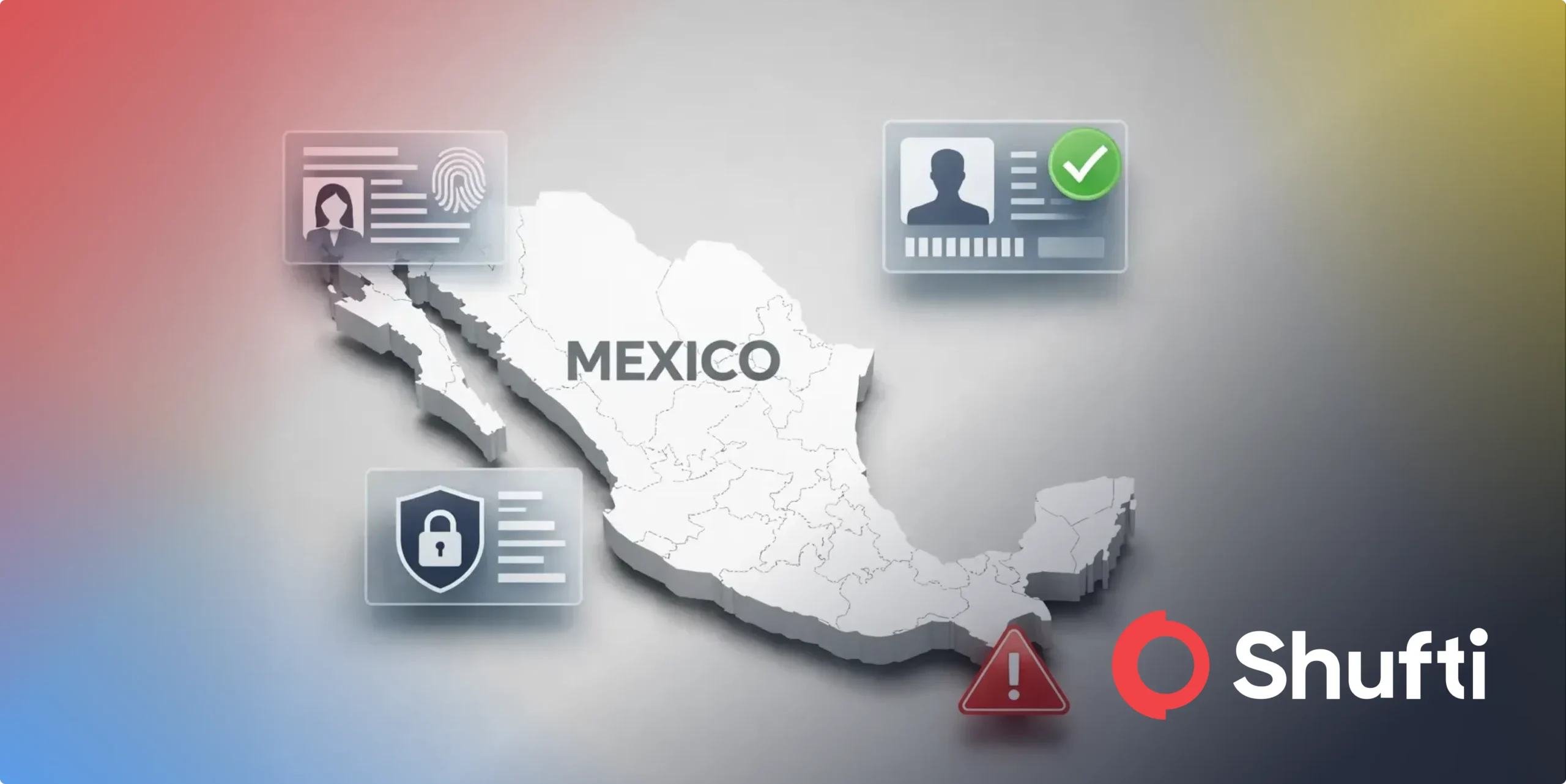Everything Businesses Should Know About Corporate Screening

The Financial Conduct Authority (FCA) slapped a big bank with a hefty fine of £42 million recently. The reason? The financial institution compromised the verification and monitoring of its corporate clients.
For organizations, this case serves as a lesson that they can’t afford to overlook screening their partners and can’t treat corporate screening as a mere box-ticking exercise!
The lack of depth and accuracy in verification causes potential threats to build over time, which eventually leads to serious legal repercussions.
Let’s discuss in detail what corporate screening is and what information is required for organizations in order to perform background checks to ensure compliance with AML and Know Your Business regulations.
What is Corporate Screening?
Corporate screening involves a comprehensive assessment and verification of a client’s identity, legitimacy, and risk profile, including that of its stakeholders. This process is more extensive and intricate than a typical customer background check, commonly known as Know Your Customer (KYC).
In the larger framework, corporate screening is often referred to as Know Your Business (KYB), which helps organizations comply with AML laws and manage risk.
It’s not just about asking an entity for its name; rather, it’s a comprehensive inquiry aimed at addressing three essential questions:
- Is this organization who they say they are?
- Who are the ultimate beneficial owners of the business?
- Is there a hidden link to criminal activity or sanctioned entities?
Why is Corporate Screening Done?
Corporate screening services help businesses engage only with reputable and trustworthy partners, vendors, or clients. One of the primary goals of the process is to ensure regulatory compliance of the financial institutions. This includes adhering to Know Your Business (KYB) and Anti-Money Laundering (AML) rules.

Moreover, this process also plays an important role in fraud prevention, as it helps identify businesses that may be involved in financial crimes such as money laundering, terrorist funding, or tax evasion. Through screenings, enterprises can assess the risk profile of potential partners, helping them avoid costly fraud and legal repercussions.
Along with these reasons, corporate background screening also helps businesses in their risk management strategies. It allows them to assess the financial stability, ownership structure, and overall reputation of potential business partners, helping them avoid unnecessary risks.
Partnering with high-risk or sanctioned entities can harm a company’s reputation. However, a comprehensive background check of potential business partners mitigates risks and aligns them with ethical standards.
Corporate Screening Regulations Around the World
Corporate screening regulations are enforced worldwide. This section features the primary regulations or laws with respect to corporate screening in different regions.
U.S. Regulations
- Bank Secrecy Act (BSA): The BSA mandates due diligence procedures for corporate entities. It aims at implementing programs for detecting and reporting money laundering activities.
- PATRIOT Act: Title III of the USA PATRIOT Act, known as “The International Money Laundering Abatement and Anti-Terrorist Financing Act of 2001,” expanded these regulations. Regulatory authorities should collect and share information about the entities they do business with.
- FinCEN CDD Rule: The Customer Due Diligence (CDD) Rule requires businesses to identify and authenticate the ultimate beneficial owners.
- OFAC (Office of Foreign Assets Control): OFAC enforces economic sanctions and aims to prevent “prohibited transactions.” Businesses must adopt measures to navigate sanctions adherence.
UK Regulations
- Economic Crime and Corporate Transparency Act (ECCTA): This UK Act aims to combat any type of economic crime while also enhancing the transparency of all corporate entities.
- Money Laundering, Terrorist Financing and Transfer of Funds (Information on the Payer) Regulations 2017: Requires businesses to conduct corporate screening by verifying corporate clients. It also makes ongoing monitoring an essential component to detect and report suspicious activities and EDD for higher-risk clients.
- Sanctions and Anti Money Laundering Act 2018 (SAMLA): Requires organizations to have a responsibility to identify risks, verify clients, monitor for potential sanctions and money laundering exposure, and report unusual activities.
- Terrorist Asset-Freezing Act 2010: This act grants power to regulators to freeze assets linked to terrorism.
EU Regulations
Company screening requirements in the European Union are enforced through AML Directives with a primary focus on AML/KYC.
- 4AMLD: Required companies to maintain and disclose beneficial ownership information (BOI). Moreover, it also aimed to expand the scope of regulated entities and enforce customer due diligence (CDD).
- 5AMLD: Amended the previous 4th AMLD and addressed new risks within the EU financial sector. It also expanded the scope of regulations, strengthened transparency obligations, and improved collaboration among authorities involved in anti-money laundering efforts.
- 6AMLD: The EU’s latest AML law requires organizations to consider comprehensive risk assessments and implement enhanced reporting tools. It also requires them to maintain UBO registers that “should be fully available” to the relevant authorities, stakeholders, and journalists to verify.
What Does the Process of Corporate Screening Look Like?
1. Collection of Important Company Data
The first step of the corporate screening is data collection. It includes gathering crucial information about the company, such as registration number, legal standing, business address, operations and activities, and ownership structure. Additionally, identifying ultimate beneficial owners (UBOs) and key individuals of an organization is also important.
2. Verification of Collected Information
Following the data collection, the next step is verifying it by cross-referencing with official sources and data portals. There are several important factors that decide the legitimacy of a business. They include details such as EIN, TIN, VAT, and UBO, along with other important business documentation. An organization verifies the collected information to ensure that the collected data points align across multiple data sources.
3. Risk Assessment
Once the verification process is done, a company is assigned a risk score that indicates different key factors. The risk score mainly considers the jurisdiction where the company operates, especially if it is located in a high-risk country, the industry it is involved in, the complexity of its ownership structure, any ties to PEPs or sanctioned individuals under sanctions, as well as any negative news. The overall risk of the company is then evaluated on these parameters.
Organizations must evaluate the risk exposure of their partners, clients, and vendors. This is because, along with risk mitigation, it further helps businesses to determine the level of due diligence required for establishing a business relationship with that company. In case the risk score is high, enhanced due diligence (EDD) is applied to the high-risk entities.
4. Ongoing Monitoring
Ongoing monitoring is the final step in corporate screening. However, it is important to know that it does not conclude with the initial check. Instead, it is important to regularly monitor changes in a company’s ownership, structural modifications, sanction status, or any negative media developments. This continuous oversight ensures that businesses remain compliant and are quickly alerted to any emerging risks that could arise during the course of the partnership.
How Corporate Screening Helps with Company Background Checks?
In the past, companies have faced backlash for doing business with entities involved in labor law violations or environmental law violations. While traditional background checks on an entity focus on its criminal history, corporate screening takes a broader approach for businesses.
Employee verification confirms an individual’s history but often lacks details about roles and responsibilities. In contrast, corporate screening goes beyond just validating company affiliations. It also helps entities ensure compliance with sanctions, anti-money laundering laws, supply chain, and ESG regulations.
Additionally, it checks businesses against sanctions lists and PEP databases, which ensures compliance with AML and KYC regulations. Ultimately, for businesses, company screening is a reliable approach that provides businesses with a more complete view of partners. It also helps them recognize potential risks and make informed partnership decisions.
Trust Shufti for Ensuring Robust Corporate Screening
Many regulated firms struggle to keep corporate screening current as ownership changes, sanctions expand, and adverse media emerges. Shufti helps enterprises fortify their defenses by operationalizing corporate screening checks through:
- Verifying the legitimacy of businesses via comprehensive Know Your Business checks.
- Screening UBOs to identify the hidden risks associated with company key stakeholders.
- Continuously screening entities against sanctions, PEP, and risk databases.
- Identifying and monitoring changes in the PEP’s risk status with real-time alerts.
- Detecting risks and negative media from over 50k+ sources in 80+ languages to assess business threats.
- Extending screening to UBOs and key business officers for comprehensive compliance.
Request a demo to see how the solution helps businesses implement corporate screening.

 Explore Now
Explore Now













